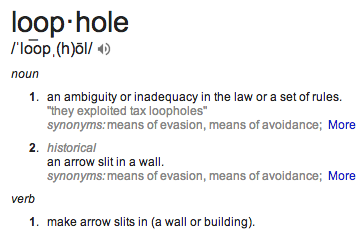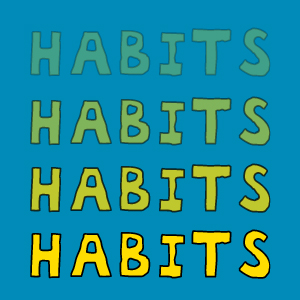Gretchen Rubin who wrote the awesome book, The Happiness Project, is working on a new book called Before and After. Her current emphasis is “how to make good habits and break bad ones.” In the new book, she identifies twenty-two strategies that we can use to change our habits. She recently wrote a really interesting series of blog posts on one of these which she calls the “Strategy of Loophole-Spotting.” She says:
“When we’re trying to form and keep habits, we often search — even unconsciously — for loopholes. We look for justifications that will excuse us from keeping this particular habit in this particular situation. However, if we recognize this behavior, if we can catch ourselves in the act of loophole-seeking, we can perhaps avoid employing the loophole, and improve our chances of keeping the habit.”
 Following are links the posts on “10 Loopholes We Use to Justify Breaking a Habit.” She says that of the twenty-one strategies she writes about, Loophole-Spotting is her favorite. (Note: These are links to her original posts – paraphrasing is mine except when in quotes.) I also think of these as loopholes for justifying breaking a good/new habit you are trying to create. Generally, when I think of “breaking a habit” it is quitting something bad like smoking or eating junk food between meals. These loopholes are definitely common ways that we can sabotage making new healthy changes (habits) stick.
Following are links the posts on “10 Loopholes We Use to Justify Breaking a Habit.” She says that of the twenty-one strategies she writes about, Loophole-Spotting is her favorite. (Note: These are links to her original posts – paraphrasing is mine except when in quotes.) I also think of these as loopholes for justifying breaking a good/new habit you are trying to create. Generally, when I think of “breaking a habit” it is quitting something bad like smoking or eating junk food between meals. These loopholes are definitely common ways that we can sabotage making new healthy changes (habits) stick.
1. False choice loophole – Assumes you can have something one way OR another when the choices are not necessarily in opposition. (e.g., I can enjoy myself or eat healthy foods.)
2. Moral licensing loophole – Giving yourself a break because you did something hard/that took effort (e.g., I ran 20 miles so I can eat whatever I want.)
3. Tomorrow loophole – The “starting tomorrow” I will eat better, exercise, etc. Just insert the habit you are trying to add/change. No example needed for this one!
4. Lack of control loophole – Not accepting responsibility for a slip up because you were in a situation beyond your control (e.g., someone brought donuts, it is a party – how could you skip the cake, etc.)
5. Apparently irrelevant decision loophole, which she renamed the planning to fail loophole – Making a decision that inadvertently impacts your ability to stick with a healthy habit (e.g., “I’ll just check my email quickly before I go to the gym…oops, I don’t have time to go to the gym, after all.”)
6. “This doesn’t count” loophole – Deciding that there are situations in which you get a free pass. These are arbitrary things like “I am on vacation”, I’m sick or it was the husband’s dessert.
7. Questionable assumption loophole – You make decisions that impact you habits based on assumptions that are not necessarily based in fact (e.g., I can’t get anything done in an hour before I leave for this meeting, “I can’t exercise if I already took a shower.”)
8. Concern for others loophole – deciding to do something because you believe that you are acting out of consideration for others/making unselfish decisions (e.g., Everyone will be uncomfortable if I am the only one not drinking or I have to keep cookies in the house in case someone visits.)
9. Fake self-actualization loophole – Acting like making a life changing habit stick will get in the way of achieving your best self/living your best life (e.g., saying “you only live once” or “I live in the moment.”)
10. One-coin loophole – looking at an action as a single event instead of thinking about how the sum of those actions will impact you in the long term. It’s the “it’s just one beer” argument.
After reading all of these, I realize, sticking with healthy habits is hard for a reason! I have definitely used all of these at some point. The ones that resonated with me most were #2, #3, #6 and #7. I have been really trying to fight #3 and have been having some success. Gretchen Rubin said in her newsletter (click HERE and click “Subscribe” to get it) that “Loophole #5 sparked the most comments. #1 is the one that is the one [she] most often invokes.
What loopholes are you guilty of using most?
PS. If you like this post, you can follow Gretchen Rubin on Twitter or like her Facebook Page. I love the newsletter and blog!


